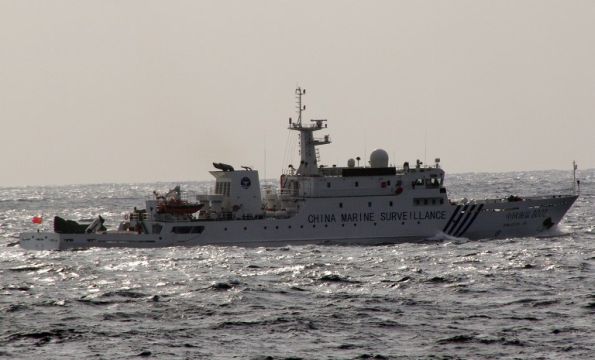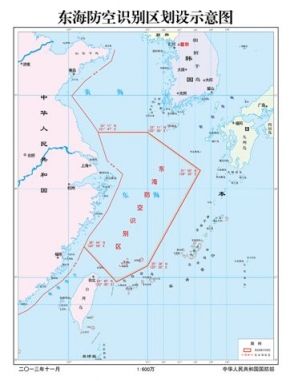
CHINA'S army acted over the weekend to impose air-traffic restrictions over a large area of the East China Sea, including the skies over the disputed island group called the Diaoyus by China and the Senkakus by Japan. The announcement of a new "Air Defence Identification Zone" (ADIZ) was issued on November 23rd by China’s defence ministry. It warned that “China's armed forces will adopt defensive emergency measures to respond to aircraft that do not co-operate in the identification or refuse to follow the instructions.”

China released a map of its new zone (pictured to the right) and said enforcement was in immediate effect. It also announced that patrols with multiple military aircraft had already taken place. The move is widely seen as escalating tensions in China’s long-simmering territorial disputes with Japan, South Korea and others.
On November 25th Akitaka Saiki, Japan's highest-ranking diplomat, delivered a “high-level protest” to China. “We are trying not to overreact,” a senior Japanese foreign-ministry official told The Economist.
In carefully calibrated remarks made to a parliamentary committee on Monday, Shinzo Abe, Japan’s prime minister, said that he was "strongly concerned that [China's move] could unilaterally change the status quo in the East China Sea, escalate the situation and create a contingency in the waters."
"We will take steps against an attempt to change the status quo by the use of force as we are determined to protect the country's sea and airspace," Abe said, according to the Kyodo news agency. "China's action will not have an effect on our country," Mr Abe said.
Japan's initial response, which has so far been restrained, was delivered over the weekend by telephone between officials at relatively junior levels. Fumio Kishida, the foreign minister, also warned publicly that the new zone “could well lead to an unforeseen situation” in the air, and that Japan cannot accept such a “one-sided” action. Japan’s defence minister, Itsunori Onodera, urged the establishment of a bilateral “communication mechanism”, to be used in case of emergency.
China has already dismissed Japan’s complaints as “absolutely groundless and unacceptable”. To judge from China’s response to complaints it has already received from other countries, Japan’s further protestations are likely to land with the same sort of thud.
John Kerry, America’s secretary of state, issued a strong statement on November 23rd: “This unilateral action constitutes an attempt to change the status quo in the East China Sea. Escalatory action will only increase tensions in the region and create risks of an incident.”
In a separate statement, Chuck Hagel, America’s defence secretary, said the United States was “deeply concerned” by “a destabilising attempt to alter the status quo in the region.” China’s announcement, he added, “will not in any way change how the United States conducts military operations in the region”. Even more pointedly, Mr Hagel reaffirmed America’s longstanding position that its mutual-defence treaty with Japan “applies to the Senkaku Islands”.
In a prompt reply, China’s foreign ministry urged America "not to choose sides” and to “make no more inappropriate remarks”. China’s aims, the foreign ministry said, “are to protect China's state sovereignty and territorial and airspace safety" and the establishment of the ADIZ "aims at no specific nation or target and will not affect the freedom of over-flight in relevant airspace."
South Korea also reacted over the weekend, albeit in a more subdued tone. Its defence ministry noted with “regret” that the new Chinese zone “partly overlaps” with Korea’s own ADIZ in the area west of Jeju island. It called for “continued discussions” and efforts “to promote mutual trust” among countries in the region.
State-run Chinese media have, like the government, dismissed foreign complaints about the move. They have also emphasised the establishment by many other states of similar air-defence zones. According to Xing Hongbo, a Chinese expert on military law who was quoted by the China News Service, more than 20 countries, including America, Canada, Australia and Japan, have set up similar zones, extending beyond their sovereign airspace.
Fu Xiaodong, another military and legal expert cited in the same article, said America was “exercising double standards”. “There is no reason for Washington to blame another country for doing the same as it has done.”
(Picture credit: AFP; Ministry of National Defence, People's Republic of China)
www.economist.com
No hay comentarios.:
Publicar un comentario